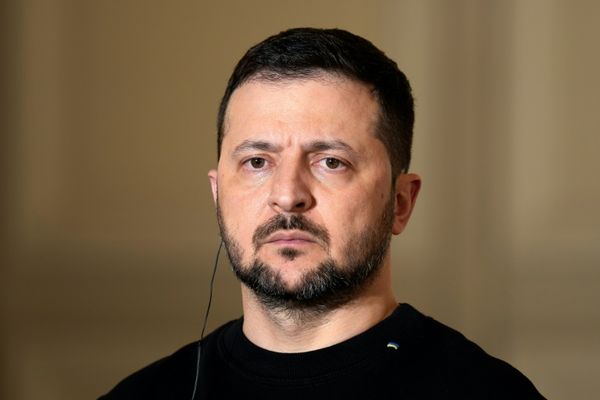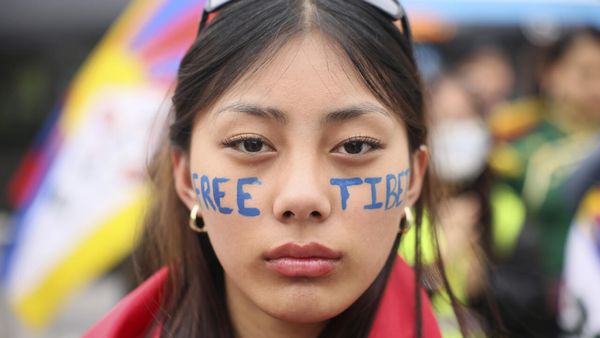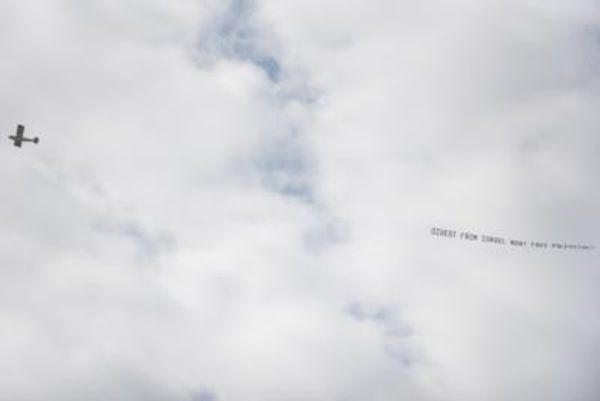
Audrey Napanangka wants to keep kids on Country and in kinship care. Her fight to do so is at the centre of a documentary that takes a look, listen, learn approach to Indigenous families and First Nations-led solutions.
Shot over a decade, the film tracks the day-to-day lives of Warlpiri woman Napanangka, her Sicilian partner Santo Giardina and their multigenerational family in Mparntwe (Alice Springs), Yuendumu and Mount Theo. The documentary first screened in 2022 at the Sydney Film Festival but is now embarking on a national tour, no states or territories spared.
Following the Alice Springs premiere last week — which included an in-person Q and A with Napanangka, Giardina, and film director and producer Penelope McDonald — Crikey spent an afternoon with the three at Napanangka and Giardina’s Mparntwe home. The trio discussed their story, how that translated to film, and how they hope to use the documentary to build momentum for a bigger campaign about the ongoing removal of Indigenous children.
“It’s a good example for other women, we fight for them,” Napanangka told Crikey. “Family is so important. You need to know where you are from.”
In 2020, Aboriginal and Torres Strait Islander (ATSI) children accounted for 6% of all Australian children and 37% of children in out-of-home care. That’s a rise from one in five to one in three since the 1997 Bringing Them Home Report into the Stolen Generations. In two decades, ATSI children in out-of-home care have almost doubled. It’s projected to double again by the end of the decade.
While Napanangka has no living children of her own, she and Giardina have brought up four kids, cared long-term for nine, and looked after many more short-term. McDonald, a long-time friend of Napanangka, said it’s very much an open-door policy: “You never know who’ll be at Audrey’s or who’s sleeping here.”

In the few hours Crikey spent in the home it was a hive of activity with family coming and going (while birds flew in for a daily feed and dogs tried to make a run for it). Hellos and logistics were woven into conversation that jumped between Italian, Warlpiri and English. The topics ranged just as diversely — family, film, painting and gardening — with the latter a personal favourite for Giardina who has transformed their backyard from “knee-high grass and not much else” into a staple Italian garden. All grown from seeds or pips, he points to fig trees, apricots, lemons, grapes, olives, tomatoes (and the list goes on).
“You know when tomatoes go black and rotten? Well I squish them all over the ground and cover it with some of the soil. Now look, I have a tomato garden,” Giardina says while simultaneously showing Crikey photos of his Italian family.
“We came to Australia as six. From six we grew to 14. And from 14 to 410,” he says proudly.
Napanangka tells him to keep quiet and stop making numbers up.
“I always keep quiet,” Giardina protests.
“Yea listen,” she chuckles before changing tack. “Ok ok, you talk.”
Just as quickly, Giardina pulls out two Medicare cards with the names of his and Napanangka’s four children — 15-year-olds Tyrese and Leanorah, 31-year-old Miriam, and Juliette, now in her early 40s. He starts crying as he recounts the day that Leanorah and Tyrese were pulled out of primary school and taken by welfare.
“I took them to school that day, I took them to school every day. And they never came home. They just bungled them into a car and took them away,” Giardina said. “My mother had 14 kids, no-one took any of them.”
Contact with the children was immediately blocked while welfare cycled them through numerous foster homes for the next two years. Tyrese and Leonarah were both returned to the family following a lengthy legal battle that found there was no good reason for them being taken. Welfare and police falsely profiled the family as alcoholics because Giardiana was (and still is) always seen picking up bottles and cans around town for extra cash.
“Last night at the cinema, the lady who took the kids from the school, she came up and said sorry,” Napanangka said. “People were crying for me.”
The trauma of removing children is ongoing for Indigenous people — children, parents, families and communities. Napanangka’s niece Juliette told Crikey that she drops into school most days at recess and lunch to keep her kids close and “keep an eye on them”.

That fear for Indigenous women starts the moment a child is born. McDonald says she knows a lot of First Nations mothers who look at the birthweight of their newborn child and worry they’ll be taken if they’re too light.
As a young woman, Napanangka lost two babies. She recounts them being alive and well one day and declared deceased the next. Hospital staff told her it was on account of ill health, but she never saw her children’s bodies.
“I remember when Audrey told me her children were taken,” McDonald said. “She said, ‘I had babies once’. She remembered because another woman had just had two of her babies taken. The trauma is there all the time. She’s constantly thinking about her children.”
What McDonald hopes to do through the documentary is stir action for the overrepresentation of ATSI children in out-of-home care. Key to this is the reorientation of resources towards supporting First Nations families. Currently 80% of Australian federal, state and territory funding goes into the out-of-home care system rather than supporting networks, programs and people to keep children in home care and on Country.
“We’re poor, not rich,” Napanangka said.
“We have a lot of family stay here often. Kids are expensive to feed. Even to play sport for kids costs money.”
Beyond policy reform, the film is designed to be “just something people can look at”, learn from, talk about, and overwhelmingly see as a “First Nation’s opportunity”.
McDonald said the film was meant to be finished two years ago, but the delay has been a blessing in disguise with the Indigenous Voice to Parliament and use of Alice Springs as a “political football” the perfect backdrop to show the country a First Nations-led solution centred on culture, language and Law.
Napanangka is involved in the Warlpiri Youth Development Aboriginal Corporation (WYDAC) program that takes kids to spend time and heal on Country. She says that “more space” at Mt Theo (where the program is based) allows Indigenous youth to learn who they are and where they’re from: “It’s a healing place. It’s always better to be on Country.”
For Napanangka, that’s also why she said yes to a film about her and her family, reiterating how important it is for them to know themselves and be proud of that.
“It was their first time seeing their face on a big screen and they loved it,” she said.
“All the ones we grew up, they came down from Yuendumu to watch. The skinny ones, the fat ones, they were all there. They were proud.”







